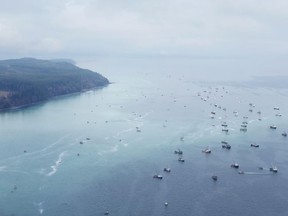Shipbreaking is considered hazardous due to the toxic substances present within a vessel, which can include asbestos, heavy metals, and hydrocarbons.

Article content
A Vancouver Island community is sounding the alarm about a lack of federal and provincial regulations targeting ship-breaking operations that can leach pollutants like asbestos and heavy metals into Canadian waters.
Announcement 2
Article content
Several residents of Union Bay, BC, located about 180 kilometers northwest of Vancouver, voiced their opposition to one such local operation during a demonstration Sunday, denouncing the lack of specific rules preventing the dismantlement of vessels on the shores of the nearby Baynes Sound.
Article content
Demonstration organizers, The Concerned Citizens of Baynes Sound, say Deep Water Recovery has been dismantling barges at a Union Bay site for the past two years, and local residents fear the operation could release hydrocarbons, raw sewage and cadmium in the water. marine environment. Baynes Sound is where 50 percent of the shellfish harvested in BC comes from and is also the location of the last commercial coastal herring fishery on the Georgia Straight, they added.
Article content
Announcement 3
Article content
But Canada has no federal rules specifically regulating shipbreaking, and the BC Ministry of the Environment says in a statement that Deep Water has the necessary permits as a company operating in the “commercial waste management or disposal industry.” waste”.
Deep Water Recovery declined The Canadian Press’s request for comment.
Union Bay resident and rally organizer Ray Rewcastle says the community was surprised to discover the lack of regulation around boat dismantling, but added that they are even more disturbed that city, provincial and federal governments had little understanding. about shipbreaking as an industry before the residents. spoke loud.
“It’s not something that should be done in an area like Baynes Sound,” said Rewcastle, who estimated that some 200 people attended Sunday’s demonstration. “It should be done in an industrial port like the Port of Vancouver, Esquimalt or Nanaimo…deepwater ports that basically can be 100 percent dry-dock.”
Announcement 4
Article content
Shipbreaking is considered dangerous due to the toxic substances present within a ship, which can include asbestos, heavy metals, and hydrocarbons.
The Comox Valley Regional District filed a notice of civil suit against Deep Water in April 2022 in the Supreme Court of British Columbia, seeking an order to prevent the dismantling of vessels at the Union Bay site due to statutory violations. of zoning.
In their legal response, Deep Water and its co-defendant Union Bay Industries said their activities “fall within the permitted uses” under the zoning statutes.
Deep Water also said city officials have conducted visits since March 2020 while barges were being transported or dismantled at the site, and have not raised any concerns.
Announcement 5
Article content
“At all material times, Plaintiff has had extensive knowledge of Deep Water’s operations and activities, including several visits by Plaintiff’s staff and elected officials, after which various representations were made confirming Deep Water’s compliance with the Zoning statute”, read the legal response. .
The BC Ministry of the Environment released a statement saying it has issued three warnings and one advisory against Deep Water after site visits and analysis of water samples, including the unauthorized discharge of waste into the environment.
In January, the province also directed Deep Water to establish a monthly monitoring and sampling plan, and the data submitted is currently under review.
“If necessary, the ministry will take further enforcement measures to ensure compliance, including pollution prevention orders,” the statement said.
Announcement 6
Article content
Courtenay-Alberni’s NDP MP Gord Johns, who represents Union Bay federally and spoke at Sunday’s rally, said Ottawa is holding consultations “through the fall” to improve Canada’s shipbreaking laws.
Johns said it’s crucial that such laws be implemented as soon as possible, as what happened in Union Bay could happen in other parts of the country if nothing changes.
He said the federal government hasn’t done enough on other fronts, such as requiring only a voluntary self-reporting certificate for hazardous materials entering Canada on foreign vessels.
But for Union Bay residents, Johns said the province and federal government should “use all the tools they have” to make sure companies like Deep Water follow existing regulations.
“By the time it came up that we don’t want to be a dumping ground for international shipping, it’s already too late,” Johns said of the federal response thus far. “You know there are ships coming into Canada that couldn’t even be brought to Mexico or the United States because we have very weak regulations… And here you have a company doing business in a community, and they haven’t obtained a social license.”
The British Columbia Supreme Court has yet to set a date to hear the case between the Comox Valley Regional District and Deep Water.



Comments
Postmedia is committed to maintaining a lively but civil discussion forum and encourages all readers to share their views on our articles. Comments may take up to an hour to moderate before appearing on the site. We ask that you keep your comments relevant and respectful. We’ve enabled email notifications: You’ll now receive an email if you receive a reply to your comment, there’s an update in a comment thread you follow, or if a user you follow comments. Visit our Community Guidelines for more information and details on how to adjust your email settings.
join the conversation